|
Books Should Be Free Loyal Books Free Public Domain Audiobooks & eBook Downloads |
|
|
Books Should Be Free Loyal Books Free Public Domain Audiobooks & eBook Downloads |
|
Non-fiction |
|---|
|
Book type:
Sort by:
View by:
|
By: Fyodor Dostoyevsky (1821-1881) | |
|---|---|
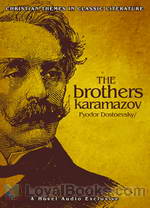 The Brothers Karamazov
The Brothers Karamazov
Set in 19th century Russia, The Brothers Karamazov (Russian: Братья Карамазовы) is the last novel written by the illustrious author Fyodor Dostoyevsky who died a few months before the book's publication. The deeply philosophical and passionate novel tells the story of Fyodor Karamazov, an immoral debauch whose sole aim in life is the acquisition of wealth. Twice married, he has three sons whose welfare and upbringing, he cares nothing about. At the beginning of the story, Dimitri Karamazov, the eldest son who is now a twenty-eight year old war veteran, returns to his home town to claim the inheritance left to him by his dead mother... | |
By: G. K. Chesterton | |
|---|---|
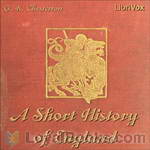 A Short History of England
A Short History of England
Gilbert Keith Chesterton was a prolific writer on many topics. His views of history were always from the standpoint of men and their interactions, and it may fairly be said he saw all of history as a battle between civilization and barbarism. So it has always been, and that remains true even today.“But it is especially in the matter of the Middle Ages that the popular histories trample upon the popular traditions. In this respect there is an almost comic contrast between the general information... | |
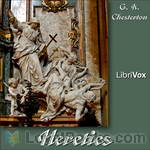 Heretics
Heretics
The Author Gilbert Keith Chesterton was born in London, England on the 29th of May, 1874. Though he considered himself a mere “rollicking journalist,” he was actually a prolific and gifted writer in virtually every area of literature. A man of strong opinions and enormously talented at defending them, his exuberant personality nevertheless allowed him to maintain warm friendships with people–such as George Bernard Shaw and H. G. Wells–with whom he vehemently disagreed. Chesterton had no difficulty standing up for what he believed... | |
 Orthodoxy
Orthodoxy
Orthodoxy is a book that has become a classic of Christian apologetics. In the book's preface Chesterton states the purpose is to "attempt an explanation, not of whether the Christian faith can be believed, but of how he personally has come to believe it." In it, Chesterton presents an original view of the Christian religion. He sees it as the answer to natural human needs, the "answer to a riddle" in his own words, and not simply as an arbitrary truth received from somewhere outside the boundaries of human experience. | |
 Eugenics and Other Evils
Eugenics and Other Evils
Most Eugenists are Euphemists. I mean merely that short words startle them, while long words soothe them. And they are utterly incapable of translating the one into the other, however obviously they mean the same thing. Say to them “The persuasive and even coercive powers of the citizen should enable him to make sure that the burden of longevity in the previous generation does not become disproportionate and intolerable, especially to the females”; say this to them and they will sway slightly to and fro like babies sent to sleep in cradles. Say to them “Murder your mother,” and they sit up quite suddenly. Yet the two sentences, in cold logic, are exactly the same.” | |
 Alarms and Discursions
Alarms and Discursions
Gilbert Keith Chesterton was an influential English writer of the early 20th century. His prolific and diverse output included journalism, philosophy, poetry, biography, Christian apologetics, fantasy, and detective fiction. Chesterton has been called the “prince of paradox.” He wrote in an off-hand, whimsical prose studded with startling formulations. Chesterton wrote about 4000 essays on various subjects, and “Ararms and Discursions is one of his collections. | |
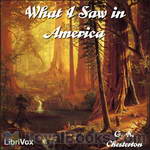 What I Saw in America
What I Saw in America
“Let me begin my American impressions with two impressions I had before I went to America. One was an incident and the other an idea; and when taken together they illustrate the attitude I mean. The first principle is that nobody should be ashamed of thinking a thing funny because it is foreign; the second is that he should be ashamed of thinking it wrong because it is funny.” (Gilbert Keith Chesterton) | |
 The New Jerusalem
The New Jerusalem
“On the road to Cairo one may see twenty groups exactly like that of the Holy Family in the pictures of the Flight into Egypt; with only one difference. The man is riding on the ass.” “The real mistake of the Muslims is something much more modern in its application than any particular passing persecution of Christians as such. It lay in the very fact that they did think they had a simpler and saner sort of Christianity, as do many modern Christians. They thought it could be made universal merely by being made uninteresting... | |
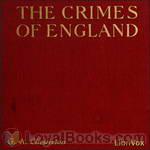 The Crimes of England
The Crimes of England
“Second, when telling such lies as may seem necessary to your international standing, do not tell the lies to the people who know the truth. Do not tell the Eskimos that snow is bright green; nor tell the negroes in Africa that the sun never shines in that Dark Continent. Rather tell the Eskimos that the sun never shines in Africa; and then, turning to the tropical Africans, see if they will believe that snow is green. Similarly, the course indicated for you is to slander the Russians to the English and the English to the Russians; and there are hundreds of good old reliable slanders which can still be used against both of them... | |
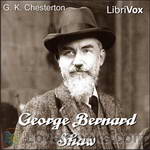 George Bernard Shaw
George Bernard Shaw
Chesterton and Shaw were famous friends and enjoyed their arguments and discussions. Although rarely in agreement, they both maintained good-will towards and respect for each other. However, in his writing, Chesterton expressed himself very plainly on where they differed and why. In Heretics he writes of Shaw: “After belabouring a great many people for a great many years for being unprogressive, Mr. Shaw has discovered, with characteristic sense, that it is very doubtful whether any existing human being with two legs can be progressive at all... | |
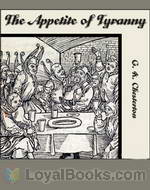 The Appetite of Tyranny
The Appetite of Tyranny
“Unless we are all mad, there is at the back of the most bewildering business a story: and if we are all mad, there is no such thing as madness. If I set a house on fire, it is quite true that I may illuminate many other people’s weaknesses as well as my own. It may be that the master of the house was burned because he was drunk; it may be that the mistress of the house was burned because she was stingy, and perished arguing about the expense of the fire-escape. It is, nevertheless, broadly true that they both were burned because I set fire to their house. That is the story of the thing. The mere facts of the story about the present European conflagration are quite as easy to tell.” | |
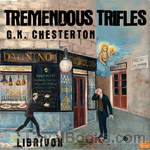 Tremendous Trifles
Tremendous Trifles
“None of us think enough of these things on which the eye rests. But don’t let us let the eye rest. Why should the eye be so lazy? Let us exercise the eye until it learns to see startling facts that run across the landscape as plain as a painted fence. Let us be ocular athletes. Let us learn to write essays on a stray cat or a coloured cloud. I have attempted some such thing in what follows; but anyone else may do it better, if anyone else will only try. ” (Gilbert Keith Chesterton) | |
 Varied Types
Varied Types
Another delightful and sharply pointed excursion into the topics of the day, and of our day as well, with Gilbert Keith Chesterton. Here he uses his wit and mastery of paradox to bring into focus a number of historical persons who in many ways typify the people who presently shape our world and who in their own right have already shaped Western civilization. These reprinted magazine articles are filled with his good natured wit and devastating ability to use reductio ad absurdum to destroy the popular myths that drive our society at full-speed into, and expose the utter nonsense that underlies, secular humanism. You will come away with yet another new collection of wonderful quotes. | |
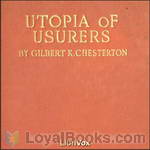 A Utopia of Usurers
A Utopia of Usurers
“Now I have said again and again (and I shall continue to say again and again on all the most inappropriate occasions) that we must hit Capitalism, and hit it hard, for the plain and definite reason that it is growing stronger. Most of the excuses which serve the capitalists as masks are, of course, the excuses of hypocrites. They lie when they claim philanthropy; they no more feel any particular love of men than Albu felt an affection for Chinamen. They lie when they say they have reached their position through their own organising ability... | |
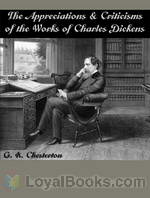 The Appreciations and Criticisms of the Works of Charles Dickens
The Appreciations and Criticisms of the Works of Charles Dickens
“These papers were originally published as prefaces to the separate books of Dickens in one of the most extensive of those cheap libraries of the classics which are one of the real improvements of recent times. Thus they were harmless, being diluted by, or rather drowned in Dickens. My scrap of theory was a mere dry biscuit to be taken with the grand tawny port of great English comedy; and by most people it was not taken at all–like the biscuit. Nevertheless the essays were not in intention so aimless as they appear in fact... | |
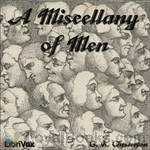 A Miscellany of Men
A Miscellany of Men
Gilbert Keith Chesterton was among the world’s most prolific writers who incorporated relentless logic, wonderful humor, and a clear view of truth into an amazing tool for exposing the foolishness of the policies of the world around him through the device of paradox.It is always great fun, and certainly always a learning experience to read Chesterton. A Miscellany of Men may be his hardest work to define, as it deals with a huge array of issues, using “personal types” as illustration. It would... | |
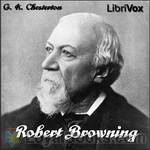 Robert Browning
Robert Browning
There is an old anecdote, probably apocryphal, which describes how a feminine admirer wrote to Browning asking him for the meaning of one of his darker poems, and received the following reply: “When that poem was written, two people knew what it meant–God and Robert Browning. And now God only knows what it means. | |
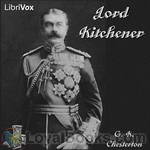 Lord Kitchener
Lord Kitchener
“The paradox of all this part of his life lies in this–that, destined as he was to be the greatest enemy of Mahomedanism, he was quite exceptionally a friend of Mahomedans.” | |
By: G. Melvin Herndon | |
|---|---|
 Tobacco in Colonial Virginia "The Sovereign Remedy"
Tobacco in Colonial Virginia "The Sovereign Remedy"
| |
By: G. W. Septimus (George William Septimus) Piesse (1820-1882) | |
|---|---|
 The Art of Perfumery, and Methods of Obtaining the Odors of Plants
The Art of Perfumery, and Methods of Obtaining the Odors of Plants
| |
By: Gaius Suetonius Tranquillus (c75 - c160 AD) | |
|---|---|
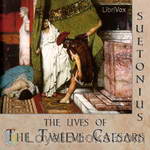 The Lives of the Twelve Caesars
The Lives of the Twelve Caesars
The Twelve Caesars is a set of twelve biographies of Julius Caesar and the first 11 emperors of the Roman Empire. The work was written in 121 during the reign of the emperor Hadrian, while Suetonius was Hadrian’s personal secretary. On the Life of the Caesars concentrates on the acts and personalities of the Julio-Claudians and their immediate successors. Together with Tacitus’ Annals, this work is a major source for the historical details in Robert Graves’ novels “I Claudius” and “Claudius the God”. | |
By: Garrett P. Serviss (1851-1929) | |
|---|---|
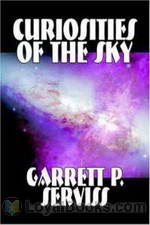 Curiosities of the Sky
Curiosities of the Sky
Is there intelligent life on Mars? Why are there starless gaps in the Milky Way? What creates the Aurora Borealis or the Northern Lights? These and more are the interesting questions that are asked and sought to be answered in the 1909 book, Curiosities of the Sky by Garrett P. Serviss. Garrett Putnam Serviss was an American astronomer and popular sci-fi writer. He believed that science should be understood and enjoyed by everyone, not just by scientists. Though he was trained as a lawyer, he went to work as a newspaper reporter with The New York Sun in 1867... | |
By: Gary N. (Gary Nathan) Calkins (1869-1943) | |
|---|---|
 Marine Protozoa from Woods Hole Bulletin of the United States Fish Commission 21:415-468, 1901
Marine Protozoa from Woods Hole Bulletin of the United States Fish Commission 21:415-468, 1901
| |
By: Gaston Maspero (1846-1916) | |
|---|---|
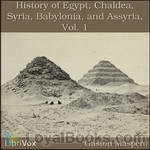 History Of Egypt, Chaldea, Syria, Babylonia, and Assyria
History Of Egypt, Chaldea, Syria, Babylonia, and Assyria
History Of Egypt, Chaldæa, Syria, Babylonia, and Assyria is the masterwork of one of the fathers of modern egyptology. This work, in twelve volumes, was translated from the French original, “Histoire ancienne des peuples de l’Orient classique” and published in 1903-1904. Maspero was a largely self-taught master of hieroglyphic translation. In November 1880, he was placed at the head of a French archeological mission, which developed later into the Institut Français d’Archéologie Orientale... | |
 Manual of Egyptian Archaeology and Guide to the Study of Antiquities in Egypt
Manual of Egyptian Archaeology and Guide to the Study of Antiquities in Egypt
A handbook of Egyptian archaeology, issued by the British Museum, considered suitable for British tourists travelling to Egypt in the 19th Century. (Introduction by Timothy Ferguson) | |
By: Gene Stratton-Porter (1863-1924) | |
|---|---|
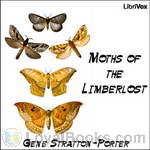 Moths of the Limberlost
Moths of the Limberlost
Gene Stratton-Porter was an American author, amateur naturalist, wildlife photographer, specializing in the birds and moths in one of the last of the vanishing wetlands of the lower Great Lakes Basin. The Limberlost and Wildflower Woods of northeastern Indiana were the laboratory and inspiration for her stories, novels, essays, photography, and movies. She was an accomplished author, artist and photographer and is generally considered to be one of the first female authors to promulgate public positions; conserving the Limberlost Swamp in her case... | |
By: General Sir John Miller Adye (1819-1900) | |
|---|---|
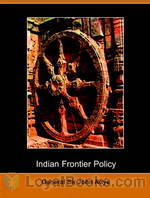 Indian Frontier Policy, an Historical Sketch
Indian Frontier Policy, an Historical Sketch
“The subject of our policy on the North-West frontier of India is one of great importance, as affecting the general welfare of our Eastern Empire, and is specially interesting at the present time, when military operations on a considerable scale are being conducted against a combination of the independent tribes along the frontier. It must be understood that the present condition of affairs is no mere sudden outbreak on the part of our turbulent neighbours. Its causes lie far deeper, and are the consequences of events in bygone years”. (From the author’s Preface, 1897). | |
By: Geoffrey H. Malins (1887-1943) | |
|---|---|
 How I Filmed the War
How I Filmed the War
An account of World War I and the experience of filming it by an early cinematographer (and, after the war, successful director) who was there. | |
By: George A. (George Alexander) Morton (1857-) | |
|---|---|
 Law and Laughter
Law and Laughter
| |
By: George Berkeley (1685-1753) | |
|---|---|
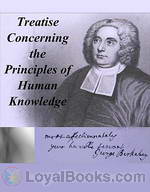 A Treatise Concerning the Principles of Human Knowledge
A Treatise Concerning the Principles of Human Knowledge
A Treatise Concerning the Principles of Human Knowledge, Part 1 (Commonly called “Treatise” when referring to Berkeley’s works) is a 1710 work by the Irish Empiricist philosopher George Berkeley. It largely seeks to refute the claims made by his contemporary John Locke about the nature of human perception. Both Locke and Berkeley agreed that there was an outside world, and it was this world which caused the ideas one has within one’s mind. Berkeley sought to prove that the outside world was also composed solely of ideas, suggesting that “Ideas can only resemble Ideas”... | |
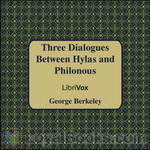 Three Dialogues Between Hylas and Philonous
Three Dialogues Between Hylas and Philonous
Berkeley uses Hylas as his primary contemporary philosophical adversary, John Locke. A Hylas is featured in Greek mythology and the name Hylas is derived from an ancient Greek word for “matter” which Hylas argues for in the dialogues. Philonous translates as “lover of mind.” In The First Dialogue, Hylas expresses his disdain for skepticism, adding that he has heard Philonous to have “maintained the most extravagant opinion… namely, that there is no such thing as material substance in the world.” Philonous argues that it is actually Hylas who is the skeptic and that he can prove it. Thus, a philosophical battle of wit begins. | |
By: George Bernard Shaw (1856-1950) | |
|---|---|
 The Perfect Wagnerite
The Perfect Wagnerite
The Perfect Wagnerite: A Commentary on the Niblung's Ring (originally published London, 1898) is a philosophical commentary on Richard Wagner's Der Ring des Nibelungen, by the Irish writer George Bernard Shaw. Shaw offered it to those enthusiastic admirers of Wagner who "were unable to follow his ideas, and do not in the least understand the dilemma of Wotan." He interprets the Ring in Marxian terms as an allegory of the collapse of capitalism from its internal contradictions. Musicologically, his... | |